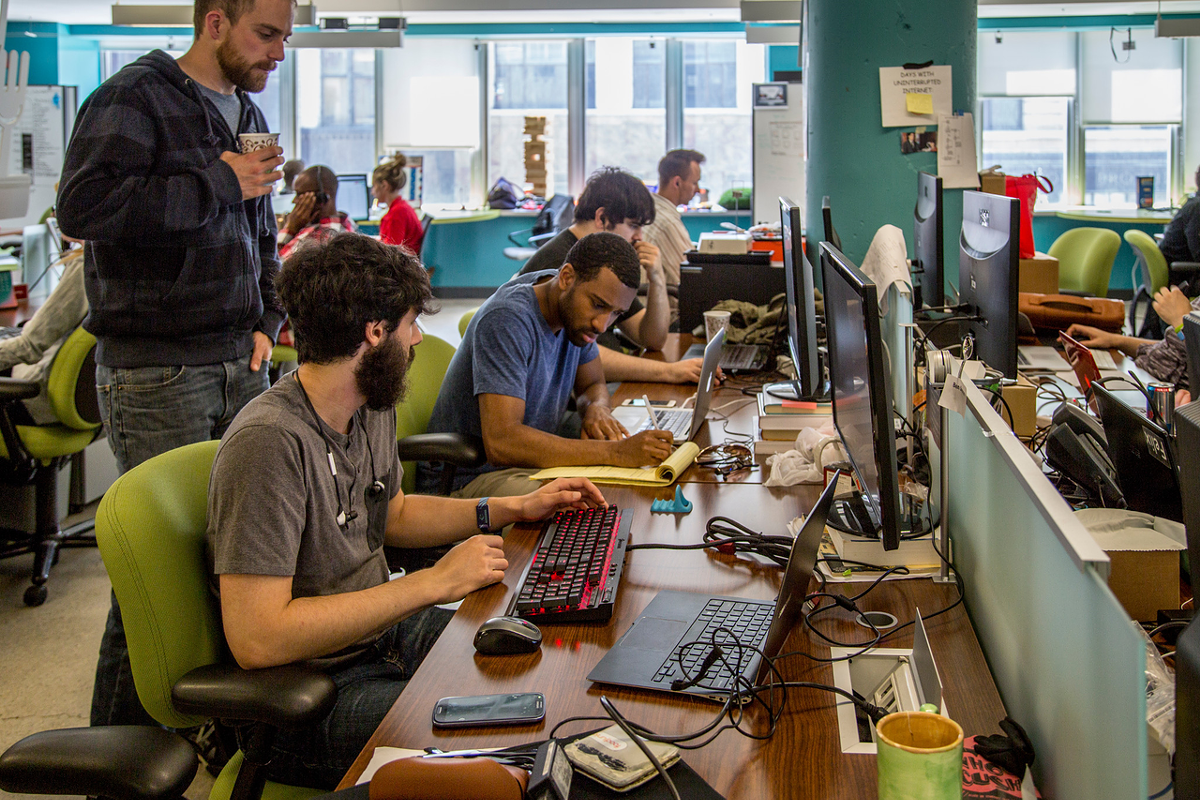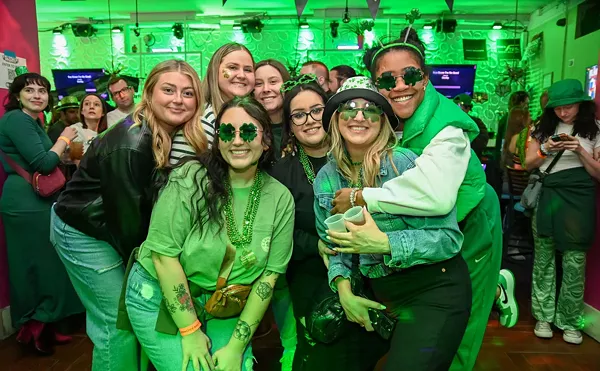For years, if you went to college in Michigan, it meant that the moment you graduated you got the hell outta Dodge and went to New York or California or anywhere that didn't have a Midwestern locale under its "Welcome" signs. These days, however, with energy building in the city center, some post-grads are drawn to the idea of staying — and some Detroiters are eager to help them do it. Is Detroit experiencing a brain gain instead of a brain drain?
Obviously Detroit has its issues. But employers are trying to sweeten the deal. Blue Cross Blue Shield of Michigan, Compuware, DTE Energy, Quicken Loans, and Strategic Staffing Solutions have paid to be a part of Live Downtown, a residential incentive program that gives employees of said companies loans and allowances toward renting or purchasing homes in Detroit, specifically the areas of Midtown, New Center, Lafayette Park, downtown, Woodbridge, Eastern Market, and Corktown. In participating in this program, the companies hope to see a profit in the future once the workers settle in.
Midtown Detroit's Sue Mosey, who helps administer the program, says, "Over the past four to five years in our programs, 2,555 new folks have moved to the district with our incentives. ... The majority of our participants are between the ages of 22 and 35, although we have older residents and families that have also used these incentives."
Potential incentives include loans of as much as $20,000 toward the purchase of a primary residence for buyers, and allowances of $2,500 for the first year and $1,000 for the second year for renters.
For Ellen Vial, a former Royal Oak resident and University of Michigan grad, Detroit was the only place she would want to live.
"When I was growing up, my dad owned a house in the Cass Corridor that he rented out to tenants, so I used to spend weekends down there with him when he was working on the house. We went to the DIA a lot, and I loved walking to the Cass Cafe for lunch with my dad on Saturdays. The neighborhood was very familiar to me and full of character," Vial says. "As I got older, I began to spend time in other parts of the city, and became very interested in the city's history, planning, and politics. Issues like poverty and racial segregation that I noticed as a kid began to take on more nuance and context, and ultimately much more importance in my education and career."
In her time at U-M, Vial got involved with the Michigan Suburbs Alliance (now called Metro Matters), a nonprofit that "works to promote prosperity, equity, and sustainability throughout metro Detroit through innovative policy solutions and collaboration across municipal boundaries." Vial is now the manager of the civil engagement programs at Metro Matters and a Mexicantown resident.
Following graduation, Vial felt a strong connection to Detroit. When picking an area to live, Mexicantown seemed like the best option. By going against the Midtown grain, Vial now resides in a cultural hub she values.
Vial says, "Mexicantown is very vibrant and really managed to weather the storm in 2008 and, subsequently, the bankruptcy. I have a lot of friends who live in the neighborhood, and I appreciate the strong sense of community. I also love how active Detroit's music and art scene is. To me, free music festivals are a pillar of Detroit's cultural scene. And, hey, the cheap rent's not bad either!"
While the Motor City's musical heritage is well-known, some argue that Detroit remains a music mecca, only in different forms. Rowan Niemisto grew up in Empire, a Michigan town in the Traverse City area with a population of 375, and did not have much of a connection to Detroit.
While at U-M studying sociology and music, Niemisto started doing film work with an ethnomusicologist for the Michigan Musical Heritage Project, a project that records performances and interviews from ethnic, roots, and folk acts in Michigan in order to archive these performances in a higher quality than before and to teach students about Michigan's wide array of music.
After graduating and forming the band Yada Yada, Niemisto knew that the place for a young band to find out what chops they have outside of Ann Arbor was Detroit.
Niemisto says Detroit is "diverse, unique, raw, and hauntingly beautiful at times. Of course, it has dark corners and some precarious foundations, but to generalize a whole city and its residents into that category is an enormous fallacy. It has a culture and attitude that I've never seen represented or repeated."
In the coming months, all of the members of Yada Yada will be moving to Detroit to write, record, and perform. Niemisto says, "It is a place where music, art, and culture are currently flourishing. The rawness and humility of the Midwest, I believe, is something that isn't felt in other parts of the country, and Detroit is becoming a center for those seeking that kind of vibe. As a musician, someone who works with video and audio, and a fan of diverse cultures and unique experiences, Detroit seems like an amazing place."
It says something that a folk, pop, and rock band like Yada Yada can be attracted to the same city as house and techno artist Ryan Dahl. Originally from Sterling Heights, when Dahl graduated from Central Michigan University in 2010, he thought he would move to Royal Oak with his friends and be back in the burbs where he grew up. But the recession had other plans: Dahl was attracted to the cheap rents that were typical downtown. And then he discovered an underground treasure: Detroit's dance club scene.
Dahl got involved as a recording artist and has been playing clubs and concerts in the Detroit area ever since. Even the culture outside of the club and the entire layout of Detroit's architecture attracted Dahl.
"I currently live in a building in Lafayette Park," Dahl says, "where I have a very large view of the river, Windsor, and downtown, and have the pleasure to live in a historical building designed by famous architect Mies van der Rohe at a fraction of what it would cost in any other city. There is no other city that I can think of where young people can have these types of opportunities. There are tons of opportunities for the arts here that is not possible in most cities."
While there are monetary and artistic attractions to Detroit, many of the young newcomers find meaningful and philosophical reasons for making the move to Detroit, including community and open-mindedness.
Dahl says, "Unlike the suburbs, there is no Costco, there is no Walmart, and there is no shopping mall. But this thing called a sense of community that I can really feel that I don't think exists as much where I grew up."
Does this handful of young activists, musicians, and entrepreneurs moving to Detroit indicate a brain gain? Maybe not. But they share a positive view of Detroit that could gain currency, and show the rest of the country how Detroit is worth a fresh look.







